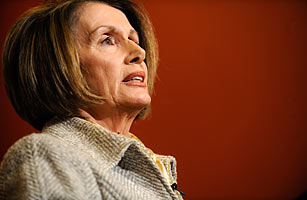
In a last-minute (successful) effort to garner 60 votes for the Senate bill, Majority Leader Harry Reid scrapped the creation of a new government-run health insurance plan. The so-called "public option" had been so weakened by the time it made it into Reid's bill that it was expected to enroll only several million people, but it was still a deal breaker for centrists like Democrat Ben Nelson of Nebraska and Independent Joe Lieberman of Connecticut. The House, on the other hand, kept a public option in its bill, though it would be financed solely by premiums without any government subsidization and is a far cry from the versions that liberals had pushed, which would have pegged reimbursements to lower Medicare rates. And regardless of the details, many Democrats in the House are determined to pass some kind of a public option because it could create lower cost competition for private insurers.
Although some of these supporters have signaled that they may be willing to drop the public option in order to get a final bill that could get 60 votes in the Senate, they will not do so without getting something in return. The likeliest concession would be more generous federal subsidies for individuals and small groups shopping in the exchange, along with possible changes to the scope of the exchange itself. The exchange, a web-accessible, marketplace for insurance, would be national under the House bill. This means that those shopping in the exchange - including many of the currently uninsured - would be bundled together in large pools. The Senate bill calls for state-based exchanges, which would have less bargaining power with providers and insurers, but which appeal to moderates in the Senate wary of centralizing too much power at the federal level. If House Dems give up the public option, they may insist that the exchange be national.
The public option-free Senate bill does have two other mechanisms for providing insurance outside the standard coverage options. Like the House bill, it would allow for and initially fund creation of non-profit consumer-owned health insurance cooperatives, though most economists say such coops would not have a major impact on the insurance market. The Senate bill would also allow the federal Office of Personnel and Management to contract with private insurers to offer at least two multi-state plans in each state exchange. These OPM negotiated plans could be less expensive than standard state-based insurance offerings, but their overall impact would be far less significant than a public option